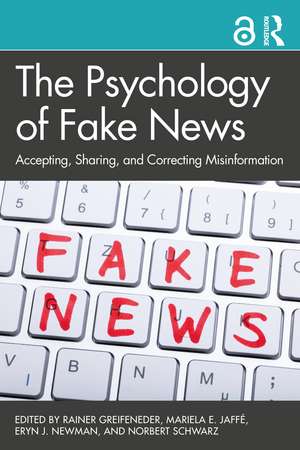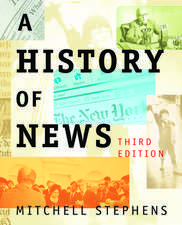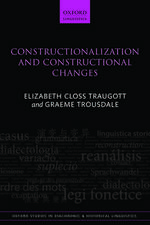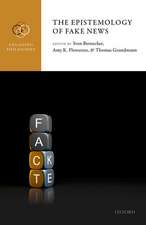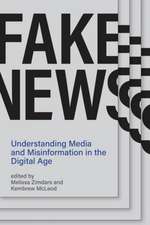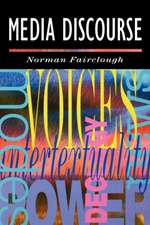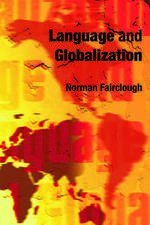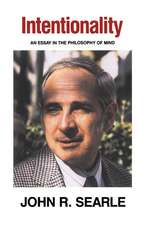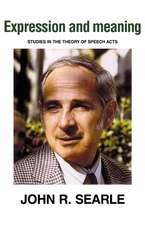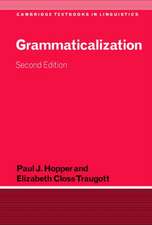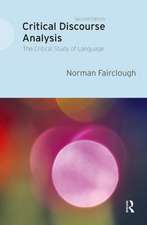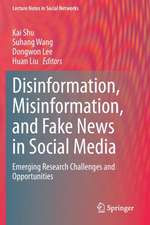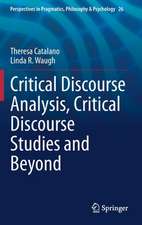The Psychology of Fake News: Accepting, Sharing, and Correcting Misinformation
Editat de Rainer Greifeneder, Mariela Jaffe, Eryn Newman, Norbert Schwarzen Limba Engleză Paperback – 14 aug 2020
This volume examines the phenomenon of fake news by bringing together leading experts from different fields within psychology and related areas, and explores what has become a prominent feature of public discourse since the first Brexit referendum and the 2016 US election campaign.
Dealing with misinformation is important in many areas of daily life, from politics and the marketplace to health communication, journalism, education, and science. At a time when facts and misinformation blur, and are intentionally blurred, this book asks what determines whether people accept and share (mis)information, and what can be done to counter misinformation? Experts from psychology and related behavioural sciences summarize key empirical findings, theories, and applications, and discuss cutting‐edge ideas. They shed light on what contributes to the acceptance and the sharing of fake news, and emphasize the critical role of online social networks in recent years.
Their insights provide guidance on how to handle misinformation in an age of "alternative facts," making this book a fascinating and vital reading for students, academics, and practitioners in psychology, education, communication, journalism, public health, policy making, and political science.
| Toate formatele și edițiile | Preț | Express |
|---|---|---|
| Paperback (1) | 295.21 lei 22-36 zile | +18.31 lei 5-11 zile |
| Taylor & Francis – 14 aug 2020 | 295.21 lei 22-36 zile | +18.31 lei 5-11 zile |
| Hardback (1) | 1003.93 lei 43-57 zile | |
| Taylor & Francis – 14 aug 2020 | 1003.93 lei 43-57 zile |
Preț: 295.21 lei
Nou
56.49€ • 59.13$ • 47.02£
Carte disponibilă
Livrare economică 10-24 martie
Livrare express 21-27 februarie pentru 28.30 lei
Specificații
ISBN-10: 0367271834
Pagini: 252
Ilustrații: 16 Tables, black and white
Dimensiuni: 156 x 234 x 13 mm
Greutate: 0.34 kg
Ediția:1
Editura: Taylor & Francis
Colecția Routledge
Locul publicării:Oxford, United Kingdom
Public țintă
Postgraduate, Professional, and UndergraduateCuprins
Notă biografică
Mariela E. Jaffé is a Postdoctoral Researcher in Social Psychology at the University of Basel, Switzerland. Her research interests focus on the construal of truth, individuals’ preferences regarding diversity, and the use of decision‐making aids.
Eryn J. Newman is a Lecturer at the Australian National University. Her research focuses on how people come to believe and remember things are true and how tangential information or "pseudo‐evidence" can bias people’s assessments of information they encounter.
Norbert Schwarz is Provost Professor of Psychology and Marketing and Co‐director of the Mind & Society Center at the University of Southern California. His research addresses the context sensitive and embodied nature of judgment and decision making and its implications for public opinion, consumer behavior, and social science research.
Recenzii
"Fake news is a serious problem for politics, for science, for journalism, for consumers, and, really, for all of us. We now live in a world where fact and fiction are intentionally blurred by people who hope to deceive us. In this tremendous collection, four scientists have gathered together some of the finest minds to help us understand the problem, and to guide our thinking about what can be done about it. What’s New and True about Fake News is an important and inspirational contribution to one of society’s most vexing problem." - Elizabeth F Loftus, Distinguished Professor, University of California, Irvine, USA
"This is an interesting, innovative and important book on a very significant social issue. Fake news have been the focus of intense public debate in recent years, but a proper scientific analysis of this phenomenon has been sorely lacking. Contributors to this excellent volume are world-class researchers who offer a detailed analysis of the psychological processes involved in the production, dissemination, interpretation, sharing, and acceptance of fake news. This book should be essential reading to anyone interested on public affairs, and especially to students, researchers, applied professionals in the social sciences." - Joseph P Forgas, Scientia Professor, University of New South Wales, Sydney, Australia
Descriere
This volume examines the phenomenon of fake news by bringing together leading experts from different fields within psychology and related areas, and explores what has become a prominent feature of public discourse since the first Brexit referendum and the 2016 US election campaign.
Dealing with misinformation is important in many areas of daily life, from politics and the marketplace to health communication, journalism, education, and science. At a time when facts and misinformation blur, and are intentionally blurred, this book asks what determines whether people accept and share (mis)information, and what can be done to counter misinformation? Experts from psychology and related behavioural sciences summarize key empirical findings, theories, and applications, and discuss cutting‐edge ideas. They shed light on what contributes to the acceptance and the sharing of fake news, and emphasize the critical role of online social networks in recent years.
Their insights provide guidance on how to handle misinformation in an age of "alternative facts," making this book a fascinating and vital reading for students, academics, and practitioners in psychology, education, communication, journalism, public health, policy making, and political science.
